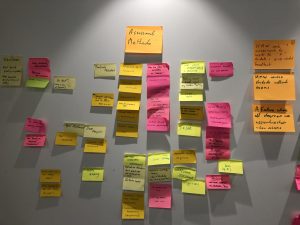It is hard to be certain of what assessment will be like in the future. However, if we can create some scenarios of what might happen, it can help us to plan what we might be able to do. To make more desirable futures happen or to reduce the chances of a less desirable one. To consider what role digital assessment will play in the future of higher education.
With this aim in mind, we ran a workshop with some institution and colleagues from Uniwise to explore some future scenarios around assessment.

I was planning to write an account of the day but Marieke Guy has done such a great job already I’d suggest you read her account of “What will assessment look like in 2035” aka Paul Bailey and post-its.
Here’s a summary of the first two activities.
Drivers and trends changing assessment in the future
What became obvious in the session is, what was missing on a political, economic, social, and technological level. If we are going to change and evolve, we need to look at the whole ‘learning and teaching process’ not just think about the end assessment. Is there too much testing and do we need to reduce it or even stop. Here are some of the things that were mentioned:
- There needs to be more collaboration with industry, this will lead to more authentic assessment and use evidence-based practice to assess competencies
- Assessment planning needs to be improved. For example, there is too much quantitative testing, without thinking about the learning outcomes. There needs to be more focus on testing the right thing
- Institutions need to be less exam reactive and more proactive in activity
- Make testing formats less traditional; there needs to be more creativity when thinking of exam formats
Imagining different assessment methods

Thinking about more innovative assessment methods, the next activity gathered some ideas about different assessment methods that are or could be used as alternatives to written exams and traditional assessments:
- Peer assessment / buddy teaching
- More practical testing of skills. It needs to be made more interactive and based on real life work scenarios. This will help students to be better prepared for the world of work
- VR rooms with real world test cases / situations in the workplace such as operations
- Assessments can focus on solving real world work problems. This will give students great exposure to what they will face when they start work
- 2 key viva questions that demonstrate that they have grasped the learning outcomes of their course
- Tailoring assessment to students’ needs, e.g. Workplace / Apprenticeships
Creating future scenarios
The next activity involved participants writing some scenarios based on a set of challenges we derived from the first activity.
The challenges that inspired the scenarios created in the workshop were.
What if…
- we could scale existing innovative assessment formats and approaches. The exam emerged to cope with the scale of assessment, when assessing individuals by asking questions, getting them to demonstrate skills or observing practice became too expensive/time consuming to implement?
- more assessment were authentic/real world?
- we had better standards for portfolio and peer assessment?
- assessments are personalised. Individuals chose the method used to demonstrate their learning. Write their own assessment?
- learning could be assessed with less assessment for example a 2 question viva in 10 minutes?
- more assessment where artifacts or performances?
- we assessed skills as well as or instead of knowledge, how might we help students to demonstrate their skills better?
We didn’t consider the scenario of no assessments, but I want to add that in as a challenge.
- What if we just stopped having exams or assessing students altogether?
The group generated 7 scenarios based around these challenges. Marieke’s blog post summarises these well and you also view all the outputs via this Miro board.
The future scenarios around assessment (currently in draft) can also be found on the Miro board.
Assumptions around the future of assessment
There were some assumptions that emerged from the workshop that are worth noting at this point as well.
- Transforming assessment will require transformation of the learning and teaching. We might also assume that if there is no change to existing learning and teaching approach, then it is only a translation of existing practice into a digital platform.
- Most innovative and transformed assessment approaches we can imagine already exist; the challenge is in scaling them. This is a rehash of William Gibson quote “The future is already here. It’s just not evenly distributed yet”.
- Digital assessment will be necessary for education to transform and scale. The move to digital is enabling transformation of assessment. Hhowever it won’t be sufficient on its own.
What works is going to vary in different contexts e.g. subject or institution. The scenarios are just ideas of what is possible. They allow us to think through what changes we would need to make if they were to happen. How desirable and feasible the changes would be for the sector.
Next steps
We are creating scenarios of the future of assessment. I will add them to the Miro board. I have combined some of the future assessment ideas created in the workshop.
We are holding an online workshop on the 7th July to explore these scenarios and consider the challenges and opportunities for digital assessment in education. If you wish to get involved, please email innovation@jisc.ac.uk
Co-authors: Sue Attewell, Nadia Bentoua

2 replies on “Assessment futures: What will assessment look like in 2035”
Nice update and capture of our first session, Paul!
Looking forward to the next one 🙂
Thanks, Rasmus
[…] workshop to explore the future of digital assessment on the 1 May 2024. I wanted to build on the Future of Assessment 2035 workshop we delivered in June 2022 and use some of the learning and resources from the Imagined […]